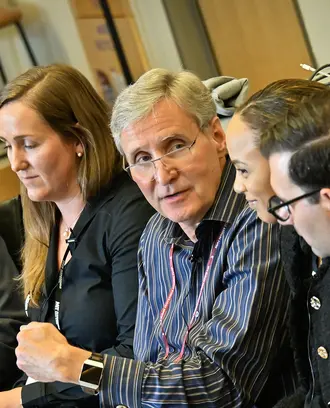In late January, Brazil launched the RendA+ treasury bond, a new retirement security adapted from the work of School of Management Distinguished Professor of Finance and Nobel Prize in Economics laureate Robert C. Merton, PhD ’70, and Arun Muralidhar, PhD ’92.
Arun Muralidhar, PhD ’92, Co-Founder of AlphaEngine Global Investment Solutions LLC
Credit: Princeton Headshots“This new bond—based on my and Professor Merton’s original research and supported by Azita Sharif and Alexandre Vitorino—converts today’s savings into guaranteed, real retirement monthly income, thereby ensuring good retirement outcomes for even those with low financial literacy or access,” says Muralidhar, co-founder of AlphaEngine Global Investment Solutions.
“It can be adopted by any country and is a good deal for governments and financial institutions, too.”
Merton and Muralidhar collaborated to create the concept of Standard-of-Living indexed, Forward-starting, Income-only Securities (SeLFIeS), which are liquid, low-cost, low-risk, and easy-to-understand instruments that embed accumulation, decumulation, compounding, and inflation adjustments into one single tool. As a result, the researchers contend, the SeLFIeS bond, which they now call the Retirement Security Bond (RSB), can lower the risk of individuals retiring poorly amid the looming retirement crisis.
Retirement without reassurance
At the turn of the century, pension liabilities began increasing while assets were decreasing, causing private-sector employers to abandon defined-benefit pensions for defined-contribution retirement plans that shift liability to employees.
“Since significant numbers of middle-class workers are now living longer and confronting rising inflation,” Merton wrote in a 2022 Financial Times article, “many face future retirement without the reassurance of an adequate pension.”
Merton believes the financial independence and security of families are the foundations of a functioning political system and democracy. Central to that is retirement which maintains a comfortable standard of living, which is measured by the amount of sustainable lifetime income received, and not by the size of accumulated savings.
Robert C. Merton, PhD ’70, School of Management Distinguished Professor of Finance
Credit: Image Courtesy of Robert MertonAround the globe, individuals are increasingly being asked to take responsibility for their own retirement planning and funding and make decisions that they did not have to do in the past and are not equipped to do in the present. Most people are financially unsophisticated and not equipped to perform basic compound interest calculations or consider the impact of inflation, both critical aspects of retirement planning.
“Individuals are being tasked with the responsibility for three complex, interconnected decisions: how much to save, how to invest with many additional decisions, and how to decumulate one’s portfolio at retirement. There must be a better way and RSB greatly simplifies these decisions,” says Merton.
The RSB concept and Brazil’s adoption of it offer hope in the face of this crisis, according to Hans Lin, MBA ’98, co-head of Brazil investment banking at Bank of America, and member of the MIT Sloan Americas Executive Board and MIT Sloan Latin America Office Advisory Council.
“It will try to resolve potential issues related to the cost of living, which is something we don’t have much control over,” says Lin. “The key point will be how many assets you would have to start with in order to be comfortable at retirement, which you would have more control over by how much you save and the age of your retirement.”
A simple solution
As Muralidhar explains, RSB offers a simple and universally applicable solution. It requires only two basic inputs from people of all levels of financial sophistication: One’s date of retirement and desired retirement monthly income. And “with very minor tweaks,” he adds, RSB can work for a variety of different countries and markets.
So far, versions of RSB have been proposed in Australia, the United States, the United Kingdom, Japan, India, Turkey, Colombia, Singapore, Portugal, Spain, and France.
“Our work was meant to provide a high-level design for countries to consider, and RendA+ reflects that while also capturing the unique features of the Brazilian system,” says Muralidhar, who is quite pleased with the results—as well as the opportunity to collaborate with Merton.
“Getting to work with Professor Merton on a nearly daily basis for the last six years, bringing major societal improvements through finance science, is an experience I will always cherish,” he says.



